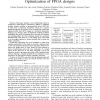IPPS
2005
IEEE
14 years 5 months ago
2005
IEEE
We propose in this paper an original design space exploration method for reconfigurable architectures adapted to fine and coarse grain resources. The exploration flow deals with c...
IEEECIT
2005
IEEE
14 years 5 months ago
2005
IEEE
In embedded systems, performance and power are important inter-related issues that cannot be decoupled. Expensive and extensive simulations in a processor design space are usually...
ICW
2005
IEEE
14 years 5 months ago
2005
IEEE
Reconfiguration and self-adaptation are vital capabilities of sensor networks and networked embedded systems that are required to operate in dynamic environments. This paper prese...
SASN
2006
ACM
14 years 5 months ago
2006
ACM
We investigate the design space of sensor network broadcast authentication. We show that prior approaches can be organized based on a taxonomy of seven fundamental proprieties, su...
ICNP
2006
IEEE
14 years 5 months ago
2006
IEEE
— The BitTorrent (BT) file sharing protocol is popular due to its scalability property and the incentive mechanism to reduce free-riding. However, in designing such P2P file sh...
DATE
2006
IEEE
14 years 5 months ago
2006
IEEE
The design of future communication systems with high throughput demands will become a critical task, especially when sophisticated channel coding schemes have to be applied. LDPC ...
DATE
2006
IEEE
14 years 5 months ago
2006
IEEE
In recent years, increasing manufacturing density has allowed the development of Multi-Processor Systems-on-Chip (MPSoCs). Application-Specific Instruction Set Processors (ASIPs)...
CODES
2006
IEEE
14 years 5 months ago
2006
IEEE
Transaction-level modeling has been touted to improve simulation performance and modeling efficiency for early design space exploration. But no tools are available to generate suc...
CODES
2006
IEEE
14 years 5 months ago
2006
IEEE
Multi-million gate System-on-Chip (SoC) designs increasingly rely on Intellectual Property (IP) blocks. However, due to technology scaling the leakage power consumption of the IP ...
SAMOS
2007
Springer
14 years 5 months ago
2007
Springer
—This paper presents a new methodology based on evolutionary multi-objective optimization (EMO) to synthesize multiple complex modules on programmable devices (FPGAs). It starts ...






